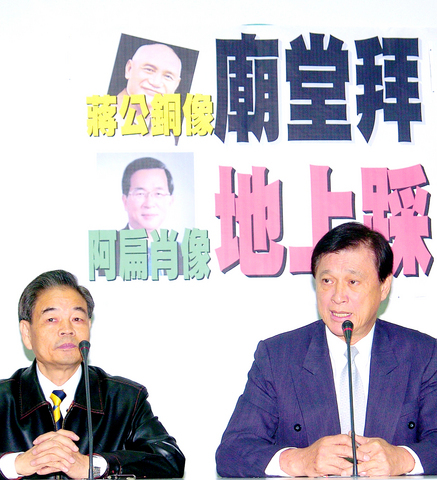The Democratic Progressive Party's (DPP) Central Standing Committee yesterday agreed unanimously to party Chairman Yu Shyi-kun's proposal that legislation concerning transitional justice should be prioritized in the legislature's next session.
Yu told a press conference that the party caucus would give priority to the enactment of five proposed laws, including an amendment to the Regulations for Handling of and Compensation for the 228 Incident (二二八事件處理及補償條例), a law designed to recover the Chinese Nationalist Party's (KMT) stolen assets, a national language law and a truth and reconciliation law.
Yu said the government should model its legislation for investigating the truth of the incident on similar legislation in South Africa and Germany because "without truth, reconciliation is impossible and without justice, co-existence is impossible, too."

PHOTO: SUNG CHIH-HSIUNG, TAIPEI TIMES
The 228 Incident, which occurred in 1947, was sparked by a conflict between anti-contraband officers and local people which led to clashes. Military forces were then called in from China, escalating the incident into a nationwide crackdown during which tens of thousands of people were arrested or killed.
Although the DPP has encountered many difficulties in dealing with transitional justice since it came in power in 2000 as a result of its failure to hold a legislative majority, its supporters still believe the party and the government should do something, he said.
Therefore, the government should quicken the pace in its attempt to distinguish right from wrong since a report published by the 228 Memorial Foundation last year had proved that dictator Chiang Kai-shek (蔣介石) should be held responsible for the incident, Yu said.
"Chiang should not continue to enjoy privileges," he said, suggesting that the military police guarding Chiang's mausoleum at the Tzuhu Presidential Burial Place (慈湖陵寢) should be withdrawn while the Chiang Kai-shek Memorial Hall should be renamed "Taiwan Democracy Memorial Hall."
"If [KMT Chairman] Ma Ying-jeou (馬英九) were to conduct sincere reflection [on the KMT's responsibility for the incident], he should declare on Feb. 28 this year that he would no longer visit the mausoleum to pay homage to Chiang," he said.
DPP Secretary-General Lin Chia-lung (林佳龍) said the committee also suggested that the Cabinet establish a team to investigate any government misconduct during the authoritarian era.
After the investigation, the team should publicize the truth and elaborate on how to deal with any misconduct, he added.
Lin said that the committee also resolved to urge the Cabinet to model any action on the experiences of other countries and abolish any memorials to the dictator.
In terms of this part of the proposal, Yu suggested stopping celebrating Chiang's birthday, which falls on Oct. 31, removing all the statues of Chiang from military bases around the nation, changing the names of all "Chungcheng Roads (中正路)" nationwide and removing Chiang's image from the nation's coins.
"Chairman Yu originally ordered government agencies to establish teams responsible for the rectification campaign on Jan. 3, 2005, when he was premier," Lin said, defending Yu from media speculation that he had put forth the proposal at this moment as part of his campaign for the DPP's presidential ticket.
"This rectification campaign is an ongoing campaign and is nothing personal," Lin said.

An essay competition jointly organized by a local writing society and a publisher affiliated with the Chinese Communist Party (CCP) might have contravened the Act Governing Relations Between the People of the Taiwan Area and the Mainland Area (臺灣地區與大陸地區人民關係條例), the Mainland Affairs Council (MAC) said on Thursday. “In this case, the partner organization is clearly an agency under the CCP’s Fujian Provincial Committee,” MAC Deputy Minister and spokesperson Liang Wen-chieh (梁文傑) said at a news briefing in Taipei. “It also involves bringing Taiwanese students to China with all-expenses-paid arrangements to attend award ceremonies and camps,” Liang said. Those two “characteristics” are typically sufficient

A magnitude 5.9 earthquake that struck about 33km off the coast of Hualien City was the "main shock" in a series of quakes in the area, with aftershocks expected over the next three days, the Central Weather Administration (CWA) said yesterday. Prior to the magnitude 5.9 quake shaking most of Taiwan at 6:53pm yesterday, six other earthquakes stronger than a magnitude of 4, starting with a magnitude 5.5 quake at 6:09pm, occurred in the area. CWA Seismological Center Director Wu Chien-fu (吳健富) confirmed that the quakes were all part of the same series and that the magnitude 5.5 temblor was

The brilliant blue waters, thick foliage and bucolic atmosphere on this seemingly idyllic archipelago deep in the Pacific Ocean belie the key role it now plays in a titanic geopolitical struggle. Palau is again on the front line as China, and the US and its allies prepare their forces in an intensifying contest for control over the Asia-Pacific region. The democratic nation of just 17,000 people hosts US-controlled airstrips and soon-to-be-completed radar installations that the US military describes as “critical” to monitoring vast swathes of water and airspace. It is also a key piece of the second island chain, a string of

The Central Weather Administration has issued a heat alert for southeastern Taiwan, warning of temperatures as high as 36°C today, while alerting some coastal areas of strong winds later in the day. Kaohsiung’s Neimen District (內門) and Pingtung County’s Neipu Township (內埔) are under an orange heat alert, which warns of temperatures as high as 36°C for three consecutive days, the CWA said, citing southwest winds. The heat would also extend to Tainan’s Nansi (楠西) and Yujing (玉井) districts, as well as Pingtung’s Gaoshu (高樹), Yanpu (鹽埔) and Majia (瑪家) townships, it said, forecasting highs of up to 36°C in those areas